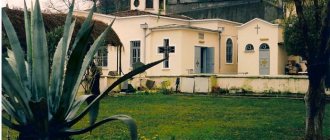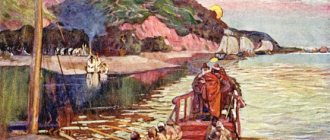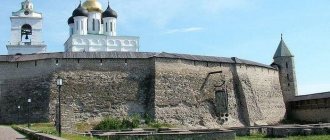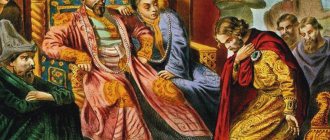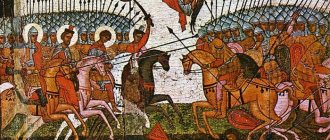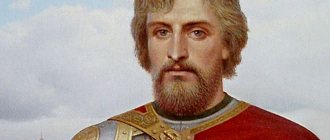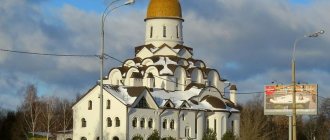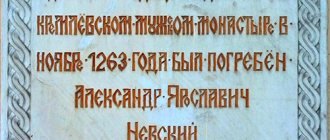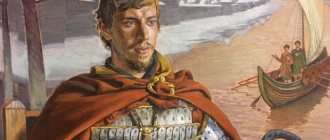4.4
Average rating: 4.4
Total ratings received: 101.
4.4
Average rating: 4.4
Total ratings received: 101.
The first Russian saints were princes Boris and Gleb. They were canonized in 1072, less than 100 years after the adoption of Christianity. The first Russian saints became the heavenly patrons of the Russian land, as recalled by several monasteries, the city of Borisoglebsk, the village of Boris-Gleb and several villages with the name Borisogleb.
Origin
They were both sons of Prince Vladimir the Saint. The date of their birth is unknown, probably around 990. According to the chronicles, Boris’s mother was either Anna of Byzantium or a “Bulgarian”. Consequently, if we remember that after 988 Prince Vladimir did not enter into new marriages, then the date of birth of Boris could be 987; during the pagan period of his life he could have had a wife of Bulgarian origin.
Rice. 1. The first Russian saints.
He received from his father an appanage throne in the city of Rostov, remote from Kyiv, on the territory of the modern Yaroslavl region. At the beginning of the 11th century, this was a distant outskirts of the Old Russian state, since Moscow, Tver, Kostroma and Vladimir-on-Klyazma did not yet exist.
His brother Gleb was also born to either Anna or a wife of Bulgarian origin. Most likely they were twins. From his father he received an inheritance in Murom. This city, like Rostov, was the outskirts of Russian lands. Around it lived the Finno-Ugric tribes of Meshchera and Murom, and to the east was the state of Volga Bulgaria. Nothing is known about the activities of the princes before 1015.
They became saints under worldly names, and their baptismal names were Roman and David. However, by the end of the 10th century the name Boris ceased to be pagan; for example, one of the outstanding Bulgarian kings was called that way.
Rice. 2. Saints Boris and Gleb.
Among the saints of Russian Orthodoxy, Seraphim of Sarov is also famous
Among the saints of Russian Orthodoxy, Seraphim of Sarov is also famous. His name in the world was Prokhor, and he was born on July 19, 1759. Since he had an excellent memory, Prokhor learned to read and write early.
From early childhood he visited the temple and prayed. At the age of 20, he decided to go to the Sarov Hermitage. In 1786, the saint was tonsured into monasticism by the abbot of the monastery.
Icon of Seraphim of Sarov. Photo: hranitel.club
He was also later ordained a hieromonk. But for himself, he decided to choose the path of solitude. He went to the forest to labor there, in strict fasting and prayer. During all the years of his life in seclusion, he was filled with love for God, and he also developed a special love for people.
During his lifetime, the Lord honored Seraphim of Sarov with grace-filled gifts, such as insight, consolation, healing of souls and bodies. One day the Mother of God appeared to him and told him to come out of seclusion and receive people with her.
Seraphim had the gift of insight; he saw what would happen to Russia before the end of its century.
This is what the saint did.
On January 1, 1833, the saint attended the liturgy for the last time, took communion and departed peacefully to the Lord. His glorification took place in 1903.
The tragic fate of Boris and Gleb
In 1015, Prince Vladimir Svyatoslavich was ill and summoned Prince Boris from Rostov. He entrusted him with a campaign against the Pechenegs. Boris did not find the enemy, so he went back to Kyiv. Along the way, he stopped at the Alta River, which is located in the southeast of the modern Kyiv region. During the campaign, Prince Vladimir died and the throne was taken by Boris's half-brother, Prince Svyatopolk. He decided to get rid of his brother, considering him a competitor for the throne in Kyiv. Assassins were sent to Boris, they pierced him with spears and stabbed him in the heart with a sword. Prince Gleb was the next to die. Svyatopolk summoned him to Kyiv. On the way, Gleb made a stop near Smolensk, where the killers found him.
Initially, Boris was buried in Vyshgorod, and Gleb near Smolensk. 4 years after the strife between Svyatopolk and Yaroslav, in 1019, his body was transferred to Vyshgorod.
They are saints not only for the Russian Orthodox Church, but also for the Catholic Church. In her lists of saints they are known as Roman the Russian and David the Polish. The date of their canonization in Rus' is still controversial, between 1020 and 1115.
Rice. 3. Boris and Gleb saints.
The first Russian saints
Although chronologically Equal-to-the-Apostles Olga and Vladimir lived earlier, the first to be canonized in Rus' were their descendants Boris and Gleb. After the death of Prince Vladimir in 1015, civil strife broke out in Rus'. His son Svyatopolk decided to eliminate all his brothers in order to rule the state alone. For his cruelty, the prince received the nickname Damned. One of the brothers was Prince Boris.
When Svyatopolk, who later received the nickname the Accursed, became the Prince of Kyiv, Vladimir’s squad, as stated in the Tale of Bygone Years, advised Boris to take the Kiev throne from him. Boris refused to fight against his older brother, because Svyatopolk became the head of the family and took the place of his father. Obedience to elders was one of the most important virtues of a person, and Boris did not violate this tradition in order to gain power, although the Kiev throne at that time was, so to speak, the most desirable goal for all princes. The fact that one of the ancestors in the family sat on the Kiev throne for at least a few days immediately elevated the entire family in comparison with those who did not have such a privilege.
Svyatopolk's behavior was exactly the opposite. He planned, like Cain, to kill Boris, for which he decided to lull his vigilance. “I want to have love with you and I will give you additional possessions received from my father,” with these words he sends a messenger to his younger brother. Meanwhile, he ordered his servants to kill Boris.
When the messengers came to the Alta River to commit the atrocity, they heard Boris singing Matins. Why? Did no one inform the prince that an assassination attempt was being prepared on him? After all, there were scouts in Ancient Rus'. And if the prince knew about the assassination attempt, why didn’t he defend himself?
As we can see, Boris remained true to the principle that one should not contradict one’s elders. In addition, he did not want to do evil in response to evil, to kill in response to murder. He didn't want to take revenge. Perhaps he was disgusted by the fact that if open clashes with Svyatopolk had begun, he would have turned out to be an unwitting culprit of mass bloodshed, because many people on both sides would have died. Boris decided to humbly accept death at the hands of his brother. Among other things, he was motivated by concern for his soul. How would he appear before the Creator if he were killed on the battlefield? Having just committed murder?
Having sung psalms and canons, Boris began to pray:
- Lord Jesus Christ! Just as You appeared on earth in this image for the sake of our salvation, by Your own will allowing Your hands to be nailed to the cross, and accepting suffering for our sins, so grant me the ability to accept suffering. I do not accept this suffering from my enemies, but from my own brother, and do not blame him, Lord, for this to be a sin.
- As we see, martyrdom at the hands of murderers is desirable for the prince, because then he will be able to follow the example of Christ. For him this is not a punishment, but a reward. A reward that was also awaited by the first Christian martyrs who died in the arena of the Colosseum.
Boris cares not only about his own soul, but also about the soul of his brother. Since death is desired, he is glad that he will accept it from a relative, and not from a stranger, and asks God to forgive the foolish Svyatopolk. After all, he “doesn’t know what he’s doing”...
Svyatopolk's servants attacked Boris and pierced him with spears. Then they wrapped the body and took it to show Svyatopolk. It is surprising, but Boris did not die until his elder brother ordered his two Varangian servants to finish him off by piercing his heart with a sword.
It was Gleb's turn. News spread slowly throughout Ancient Rus', the messenger could easily have been killed, so Gleb probably did not know that his father Vladimir had died. Svyatopolk took advantage of this and informed his brother that his father was calling him to him because he was very ill. Gleb, like Boris, was obedient to his elders, and therefore hastened to come to his father.
Gleb was on the road when news came to him from another brother, Yaroslav, that Vladimir had died and Svyatopolk had killed Boris. Having learned about this, Gleb “cried out with tears,” as the chronicle says:
- Woe to me, Lord! It would be better for me to die with my brother than to live in this world. If I had seen, my brother, your angelic face, I would have died with you: now why am I left alone?.. If your prayers reach God, then pray for me, so that I too may accept the same martyr’s death.
“Just at this time, messengers from Svyatopolk arrived, and Gleb, like his brother, was killed with a sword.
“So he was sacrificed to God, instead of fragrant incense, a reasonable sacrifice, and accepted the crown of the kingdom of God, entering the heavenly abodes, and saw his longed-for brother there, and rejoiced with him with the indescribable joy that they were awarded for their brotherly love,” it says in The Tale of Bygone Years.
Two brothers (their Christian names are Roman and David) were canonized as passion-bearers. According to Metropolitan Juvenaly, “in the liturgical and hagiographic literature of the Russian Orthodox Church, the word “passion-bearer” began to be used in relation to those Russian saints who, imitating Christ, patiently endured physical, moral suffering and death at the hands of political opponents.”
Let us note that the canonization of Boris and Gleb served as an example for the canonization of Emperor Nicholas II and the royal family.
Perhaps the story of the official recognition of the first Russian saints is perhaps more interesting and richer in events than their biography. By the way, politics also plays an important role here.
After the murder of his cousins Boris and Gleb, Svyatopolk had to fight their brother Yaroslav the Wise. The strife ended with Svyatopolk fleeing to Poland, and Yaroslav taking the Kiev throne.
In 1054 Yaroslav died, and his sons divided the lands among themselves. Izyaslav (the eldest) remained in Kyiv, Svyatoslav (the middle) occupied the Principality of Chernigov (which, by the way, included the Murom lands of Gleb), and Vsevolod (the younger) became a prince in Pereyaslavl. The Principality of Rostov, where Boris had previously ruled, went to him.
Looking ahead, we note that the son of Vsevolod Yaroslavich was Vladimir Monomakh.
In ancient Russian literature there are several monuments dedicated to Boris and Gleb. A surprisingly clear political orientation can be traced in these documents.
Initially, the veneration of Boris and Gleb was not joint; the veneration of Gleb (although he was the younger) developed earlier in the Smolensk region, where the prince was killed, and in the capital of the principality, Chernigov. Reliquary crosses with the image of Gleb were made there, and his body was placed in a stone sarcophagus; at the same time, the relics of Boris rested in a wooden, less durable shrine (you can read about this in the article “The Tale of Bygone Years” for 1072, which tells about the transfer of the relics of the brothers to the church built for them in Vyshgorod).
The sons of Yaroslav were at enmity, and in 1073 Svyatoslav, having secured the support of Vsevolod, expelled his elder brother Izyaslav from Kyiv. This was a violation of the principle of succession to the throne laid down by their father, according to which the eldest man in the family should sit in Kyiv.
A year before, Izyaslav built a wooden church dedicated to Boris and Gleb. Svyatoslav decided to install a stone one instead. It was supposed to be a grandiose five-domed temple. The walls were raised 3 meters when the prince died. It was in 1076, and Izyaslav, who had been expelled 3 years ago, returned to Kyiv. After 2 years, he died in a battle with the son of Svyatoslav, and Vsevolod became the Prince of Kyiv. He resumed construction of the stone church of Boris and Gleb.
One can find interesting political aspects in the monuments dedicated to these saints. Researcher A. Uzhankov, for example, suggests comparing several texts. For example, articles from “The Tale of Bygone Years” and “The Tale of Boris and Gleb”, dedicated to the transfer of the relics of saints to the wooden church built by Izyaslav in Vyshgorod.
The Tale of Bygone Years only mentions Metropolitan George, who was officially installed in Rus' with the knowledge of Constantinople. In addition to George, the “Tale ...” speaks of Metropolitan Neophyte of Chernigov. In addition, in “The Legend...” there is an episode when Metropolitan George blesses Izyaslav, Svyatoslav and Vsevolod with the hand of Gleb, and the saint’s nail remains on Svyatoslav’s head as a sign of special grace. The Tale of Bygone Years does not talk about this.
What's the matter? There is an opinion that “The Legend…” was written by an author who was a political supporter of Svyatoslav, who ruled in Chernigov. Since the veneration of Gleb was widespread precisely in the Chernigov lands, the saint began to be considered the patron saint of the Svyatoslavichs. Therefore, princes, as an unknown storyteller writes, are blessed by the hand of the younger Gleb, and not the elder Boris, because Gleb is closer to the prince. That is why it is noted that the saint especially favors him.
It must be said that such support from the saint was very necessary for the prince, who decided to break the law and take the Kiev throne from his elder brother.
Taking history into account, the mystery of the second metropolitan, not mentioned in the chronicle, is also resolved. There is an opinion that at that time there were two metropolises in Rus' - Kiev and Chernigov. Hence the two metropolitans. There is another version. Svyatoslav ruled in Kiev from 1073 to 1076. After the celebrations of 1072 associated with the transfer of the relics of the saints, Metropolitan George left for Constantinople, and his successor John arrived only in 1077. Therefore, the metropolitan see was empty, and under the prince he could well to be the “acting” Metropolitan Neophytos, who was appointed by Svyatoslav. Hence the discrepancies between the “Tale,” compiled by an author who wanted to strengthen the authority of Yaroslav, and the “Tale of Bygone Years,” the compiler of which had a negative attitude towards the prince.
The “Tale…” itself was probably commissioned on the occasion of the construction of a new stone church of Boris and Gleb and should have been timed to coincide with the day of the second transfer of their relics, but Svyatoslav died before the construction was completed.
Despite the fact that Gleb was more popular in Rus' and began to be revered earlier, nevertheless, in the end, the veneration of Boris and Gleb, and not Gleb and Boris, was established. Why? Here again there is a political background. On the one hand, the head of the family should be the eldest in the family (as Yaroslav the Wise also bequeathed), and the eldest of the two brothers should be Boris. On the other hand, Gleb’s championship could not help but evoke associations with Svyatoslav, who revered him. But the prince broke his father’s covenant. It would have been much more correct in every sense to give a kind of “primacy” to Boris.
Moreover, in 1113, Vladimir Monomakh, so beloved in Rus', became the Prince of Kyiv. He improved the existing laws in every possible way, increased the international authority of the state (by the way, he was married to an English princess and was the grandson of the Emperor of Constantinople), and left his children a guide to a righteous life - the famous “Teaching...”. In a word, Monomakh was a very correct and pious prince, an example for all other rulers.
And Monomakh, as we remember, was the son of Vsevolod, and Vsevolod reigned in Pereyaslavl and owned the former lands of Boris, so Boris was considered the patron of the Vsevolodovichs. It is no coincidence that Monomakh recalls him in his “Teachings...”. So, from this point of view, primacy was given to Boris, the “patron” of the Kyiv Prince Vladimir, respected by the Russians.
Under Monomakh 2 (in the new style - May 15), 1115, the 2nd transfer of the relics of Saints Boris and Gleb took place, which were placed in a wooden church that was finally rebuilt in Vyshgorod.
As for the time of the canonization of Boris and Gleb, then, in all likelihood, this happened between 1086 and 1093.
https://www.taday.ru/text/60839.html
Holy laymen and women.
Their names are not so numerous in Russian calendars, but understanding the content of their feat, for which they were canonized, significantly complements the idea of Russian religiosity and clearly shows that holiness was not limited to the walls of monasteries, but permeated the entire thickness of people's life. People's piety treats infants who died a violent death with special reverence. Babies were seen as pure sacrifices brought to the slaughter ( see also
HOLY CHILDREN). It was as an innocent murdered baby that he was canonized in the 17th century. Tsarevich Dimitry of Uglich. There are cases of canonization by the church of laity, the meaning of whose feat is social simplification: the rich and powerful of this world voluntarily renounce their wealth and power and lead the lifestyle of a simple peasant. Such a saint was, for example, a nobleman by birth, Simeon of Verkhoturye (17th century). The sanctity of agricultural labor is also attractive to the Russian consciousness. Thus, in the life of Artemy Verkolsky, a boy killed by lightning (16th century), it is especially emphasized that rural labor at an early age became his earthly feat. The life of Juliania Lazarevskaya (17th century) provides an example of how deeply the Gospel could enter the life of a layman. Juliania Lazarevskaya is an example of fidelity to maternal and marital duty, an example of meek, perfect love, which allowed her, forgetting her own infirmities, to take care not only of her family, but also to feed the poor in times of famine, bury the dead, and wash the sick in the bathhouse during an epidemic. Almsgiving in various forms of manifestation became the basis of her worldly Christian deed. Juliania Lazarevskaya was canonized at the beginning of the 20th century. The life of the saint was widely popularized by Russian writers, who saw in her the embodiment of the love of people characteristic of the Orthodox intelligentsia.
Christianity before baptism: the first attempts of princes to baptize Rus'
The first Christians found themselves in Slavic settlements and trading posts already in the 9th century, and possibly earlier - in any case, archaeological finds of characteristic ritual artifacts in Staraya Ladoga, where the semi-legendary Rurik would arrive, date back to this century. Fossil data correlates well with reports from written sources, according to which some “Rus” adopted Christianity in the middle - second half of the 9th century: these events are often associated with the reign of Askold and Dir in Kyiv.
Engraving by F. Bruni “The Death of Askold and Dir.” Source: Essays on events from Russian history, composed and engraved by professor of painting F. Bruni
By the 10th century, a large number of Christians lived in Kyiv and Novgorod, the largest cities of the united state created by the Prophetic Oleg. This is also confirmed by the results of archaeological excavations. Important changes in the religious composition of the population of Ancient Rus' also coincide with the key political event of that period - the adoption of Christianity by Princess Olga, the widow of Igor Rurikovich, killed by the Drevlyans.
Baptism of Princess Olga. Source: wikipedia.org
Already at this time, serious problems associated with Christianity were emerging. In 959, the German Bishop Adalbert of Magdeburg went to Rus' - this visit was the result of satisfying the request of Princess Olga addressed to the Emperor of Germany Otto I, regarding assistance in the spread of Christianity in Russian lands. However, the mission of the clerics was not successful. After some time, the bishop returned to his homeland, and some of his associates were killed by pagans - it is believed that not without the participation of Olga’s son, Svyatoslav.
New attempts to establish contacts with religious leaders of the West were recorded during the short-term reign of Yaropolk Svyatoslavich, the brother of the future baptist of Rus'. In 979, he turned to the Pope with a request to send clergy to Kiev for sermons, which managed to turn against himself not only the pagan circles of the capital, but also the Christians living in the city, who gravitated towards eastern practices of confession of faith. This short-sighted step largely predetermined the defeat of Yaropolk in the fight against Vladimir.
Yaropolk Svyatoslavich surrounded by his squad. (commons.wikimedia.org)

